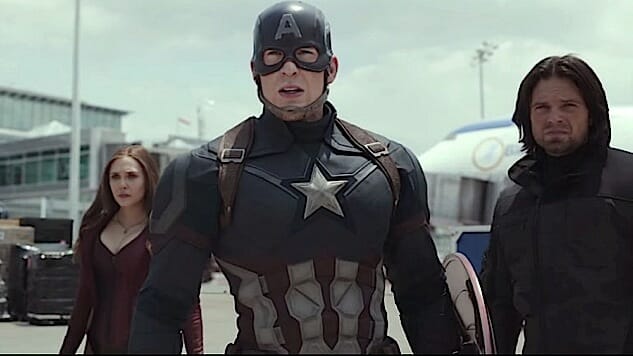The Curious, Might-Makes-Right Politics of Captain America: Civil War

Captain America: Civil War begins with an operation in Lagos, Nigeria, as the Avengers defend against an armed incursion on the Institute for Infectious Diseases. It’s the sort of furious set piece one often sees in the first minutes of action movies, as conventional as Saturday Night Live’s cold open, and the point of reference is James Bond, or perhaps Jason Bourne: Our heroes rely as much on the amnesiac agent’s rapid-fire form of jujitsu as on their special powers, and the chaos that ensues is akin to the collapse of a building on the Day of the Dead. Even the supernatural becomes an entrée to issues of collateral damage and civilian oversight. When the Scarlet Witch, Wanda Maximoff (Elizabeth Olsen), loses control of one of her hexes, it lands with the force of a misdirected drone strike, an unintended consequence in a war much like our own.
That the film’s interest in the moral quandaries of the present conflict is no more than hand waving might be the kind of criticism that provokes a sigh, or worse, from fans. (“Why do you have to analyze everything?” the polite ones ask. “Why can’t you enjoy things? It’s just a movie!”) But the curious politics of the latest installment in Marvel’s “cinematic universe” demand consideration, if only because the film ultimately deflects its own central question. Though framed as a complex, multifaceted treatment of the responsibilities that come with being the world’s policeman, Captain America: Civil War turns out to be an entertaining, globetrotting paean to unfettered Western might, superhero neo-liberalism in shitty 3D.
The (self-) seriousness of the modern actioner is not unique to Marvel—from Christopher Nolan’s Dark Knight trilogy and the Bourne franchise to Daniel Craig’s dour Bond, it’s the movies themselves that seem unable to enjoy things these days—and, if anything, MCU mastermind Kevin Feige has guided his stable of writers, directors, and stars toward the playful patter of another era. The most diverting sequence in Civil War, for instance, is essentially apolitical, an intramural confrontation among the Avengers’ two factions peppered with so many inside jokes and sight gags that the ideological underpinnings of the contretemps finally, mercifully, melt away. The rest of the film, by contrast, is fraught with mutant messages from a past with real-life referents, a nauseating brew of misappropriated historical symbols that snatches the ostensible “nuance” of the storytelling from right under the viewer’s nose.
After Wanda’s deadly mishap in Lagos, support swells for U.N. monitoring of the Avengers, and Civil War at first gestures toward a debate between internationalism and the sovereign state—at a moment, notably, in which Britain is reassessing its participation in the European Union and presumptive GOP nominee Donald Trump has deemed NATO “obsolete.” Iron Man Tony Stark (Robert Downey, Jr.) argues in favor of signing on to the Sokovia Accords, claiming that “working without boundaries” makes the Avengers “no better than the bad guys,” while Captain America Steve Rogers (Chris Evans) refuses, worried that they’ll be rendered ineffective by bureaucratic red tape. “The safest hands,” he counters, “are still our own.”
-

-

-

-

-

-

-

-

-

-

-

-

-

-

-

-

-

-

-

-

-

-

-

-

-

-

-

-

-

-

-

-

-

-

-

-

-

-

-

-








































